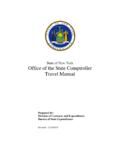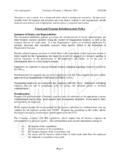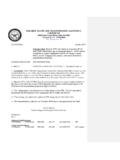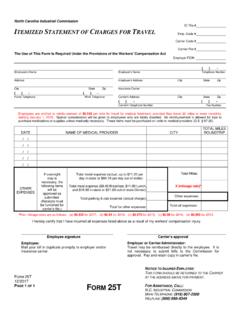Transcription of TRAVEL POLICY TEMPLATE
1 TRAVEL POLICY TEMPLATE TRAVEL POLICY OVERVIEW OF THE WRITTEN TRAVEL TRAVEL TO AND FROM THE AIRLINE EXPENSES CONNECTED WITH AIR CAR ACCIDENTS WHILE DRIVING RENTAL BUSINESS REIMBURSABLE COMBINED BUSINESS AND PERSONAL DURATION OF CASH NON-REIMBURSABLE REPORTING TRAVEL POLICY Development The material in this section is a compilation of different kinds of TRAVEL and Expense (T&E) POLICY statements on airline TRAVEL , lodging, car rental, business meals, and reimbursement expenses. You will have at least three different POLICY statements covering every aspect of TRAVEL from which to choose. By choosing the appropriate statement from each section, as in ordering off a menu, you will have a complete written T&E POLICY to suit your individual needs. The most successful written TRAVEL POLICY leaves nothing to the imagination and spells out in detail the exact requirements for employee TRAVEL .
2 Use these statements as guidelines in formulating your own corporate TRAVEL POLICY . While reading through each statement, remember that each is not mutually exclusive and really should be combined in order to develop the correct POLICY for your company. Please feel free to contact us at Perkins TRAVEL at anytime. We will instruct all our agents that your POLICY must be followed unless countermanded on an individual basis by management. Keep in mind that employees have favorite airlines, frequent flyer memberships, and other preferences that are counter to "lowest cost" T&E policies. It must be understood that in following company POLICY some employees will be irritated at Perkins TRAVEL . Therefore, Company support of Perkins TRAVEL is a necessity for a successful program. Overview of the Written TRAVEL POLICY Sample A The following is the reimbursement POLICY for ABC Company for expenses incurred during required TRAVEL .
3 This POLICY statement supersedes all previous regulations governing TRAVEL reimbursement and conforms to the requirements of government agencies. It is intended that this POLICY cover all aspects of reimbursement of costs incurred during trips on Company business. As with any statement of procedures, exceptions are expected; however, request for such exceptions must be made in a full written explanation and are subject to review. Such an explanation may be made on the completed trip expense report or by attachment thereto. Authorization for exceptional expenditures may be granted in advance by contacting the (company official). Written authorization will be attached to the completed trip expense report. In order to maximize ABC Company's TRAVEL buying power, ALL air and hotel reservations must be made through Perkins TRAVEL . Sample B Purpose The purpose of this POLICY is to set POLICY and define responsibility for TRAVEL and entertainment expenses that the Company will reimburse to employees.
4 Scope This POLICY applies to all employees of ABC Company and its subsidiaries ("the "company"). POLICY It is company POLICY to reimburse employees for certain expenses incurred by the employee in the pursuit of company business. The intent of this reimbursement is to cover those expenses incurred by the employee over the normal expenses the employee would incur. All expenses must be ordinary, reasonable, necessary, and have a valid business purpose. This POLICY covers items normally encountered as business or TRAVEL expense. The company expects its employees to use good judgment. The company recognizes there will be times when you must exceed "normal" expenses. Such occasions should be the exception and not the rule and should be adequately explained on the expense report. The employee should always keep track of his/her exact expenditures. The IRS tax code includes certain guidelines on legitimate TRAVEL expenses that are allowable for tax reporting purposes.
5 These guidelines serve as basic POLICY guidelines for the Company's reimbursement of TRAVEL and entertainment expenses. Complete explanations and documentation must be present on expense reports to meet IRS specifications for qualified business deductions. Receipts should be obtained whenever possible. Receipts for individual expenditures of $ . or more are required. In order to maximize ABC Company's TRAVEL buying power, ALL air and hotel reservations must be made through Perkins TRAVEL . TRAVEL To and From the Airport It is expected that each employee use the best means of traveling to and from the airport, taking into consideration cost, time and transportation availability. Public Transportation The cost of necessary public transportation is reimbursable and does not require a receipt. Since this is usually the least expensive, it is to be considered first. It is understood that this method of transportation is the most time consuming and sometimes the least available.
6 Taxi A taxi may be used to and from the airport. Cost must be considered when choosing this method of TRAVEL . Where this cost exceeds the cost of a rental car and such rental car is available, then the rental car should be selected. All taxi charges in excess of $ . must be presented with a receipt. Rental Car The rental car should be selected when the mileage is prohibitive and will increase the cost of a taxi beyond that of a rental car. Since rental cars are charged by the day and sometimes also by the mile, the car may be rented the night before or returned the morning after the completion of the trip if it does not exceed the term of the rental. A receipt must accompany all requests for reimbursement . Private Auto Private auto may be used in all cases. Payment for this type of transportation will be made at $ . per mile plus parking charges and tolls (receipts required). Limousine / Town Car Under special circumstances, employees and/or officers will be granted the permission to TRAVEL in a luxury limousine or town car.
7 Approval for such transportation must be in writing directly from the Department Head. Airline TRAVEL Sample POLICY A Employees of ABC Company are advised to use special economy, coach, or comparably priced fare types for domestic TRAVEL . Business Class may be used for Trans-Continental and overseas flights. In those special instances where circumstances necessitate First-Class TRAVEL , approval must be secured from the (indicate company official). Attach approval to the appropriate expense report. Officers and key managers in salary grades X and above will be eligible to TRAVEL First Class when traveling on company business, but Group Presidents and other corporate officers may adopt more restrictive eligibility requirements within their organization. Due to safety factors, restrictions on corporate officers traveling together on any one commercial or company aircraft are as follows: - No more than three corporate officers; - Only one member of the Executive Office; - Only one corporate officer from the same operating or staff unit.
8 Operating and staff units are encouraged to establish similar restrictions within their respective units. The Company's TRAVEL agent (Perkins TRAVEL ) provides insurance coverage for employees for accidental injury or death while traveling on company business. Any purchase of business TRAVEL insurance is personal expense. Sample POLICY B Employees are encouraged to TRAVEL Coach (Y) or on special restricted fares, when available if the in-flight time does not exceed three hours. First/Business Class TRAVEL , when authorized by the responsible corporate officer, is permissible for flights exceeding in-flight time of three hours. The choice between First/Business Class and Coach should be made with due consideration of the difference in costs, availability of space in the Coach section, and work to be performed en route. An employee traveling on a fare other than the Coach (Y) fare shall not receive credit for the difference between the cost of such TRAVEL and the Coach fare.
9 This also applies to employees choosing to TRAVEL Coach when First/Business Class is permitted. Under special circumstances with approval of the responsible corporate officer, it is satisfactory for large people to fly First Class if they are too uncomfortable flying Coach. Dues and/or initiation fees for airline clubs are not reimbursable by the Company. Sample POLICY C 1) Advantage should always be taken of the various special low fares offered whenever possible. To obtain the lowest possible prices, the following will be enforced: a) Reservations must be made a minimum of 7 days in advance of TRAVEL date b) Saturday night stays will be used when the fare saves at least $ .. c) Non-refundable tickets should always be used. d) Alternate airports/airlines will be used if the difference is greater than $ .. e) Try to schedule all TRAVEL on Tuesday through Thursday. 2) First and/or Business Class is optional for Vice-Presidents and above; it is optional for other employees traveling with a Vice-President or with a client who travels in said Class.
10 With a Vice-President's approval, First/Business Class may also be used when no other reasonable method is available. 3) First/Business Class may be considered an option, if traveling outside the contiguous United States and Canada, and if the flight is more than four hours. 4) No more than three corporate officers, Vice-President or above, or more than 15 employees may TRAVEL together in the same aircraft. If it is necessary that they do so, exception approval must be granted by the Controller so that consideration may be given to securing additional insurance coverage. 5) Employees may not pilot a private plane while on Company business. 6) Employees may not fly on a corporate or private aircraft unless: a) the aircraft carries an FAA Standard Category Airworthiness Certificate, and the pilot is certified; b) evidence of no less than $ . of Aircraft Liability (including Passenger Liability) insurance on the aircraft is produced.





